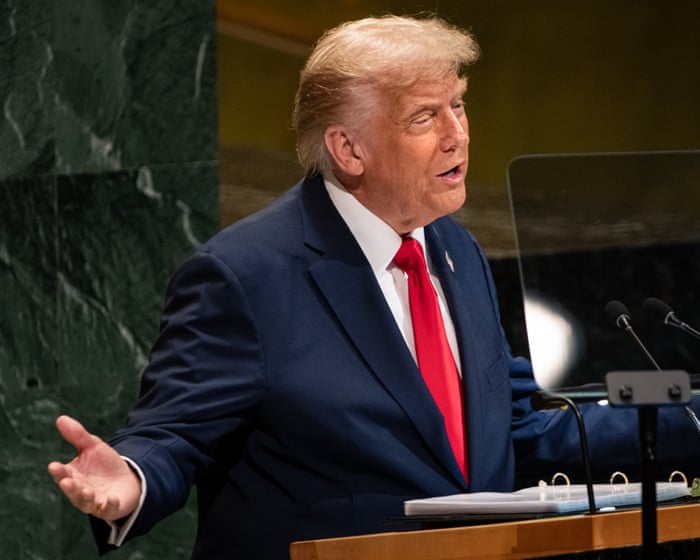Last month at the UN, Donald Trump dismissed the climate crisis as “the greatest con job ever perpetrated on the world.” With these words, the U.S. president rejected the overwhelming scientific consensus and everyday evidence that anyone can verify with a simple thermometer. He has also confirmed that the U.S. will withdraw from the Paris climate agreement, which was signed in 2015 by 195 UN nations. In doing so, the U.S. aligns itself with a small group of non-ratifiers, including Yemen, Iran, and Libya.
Ironically, Trump’s reversal could create an opening for others to push the climate agenda forward—outlining a new global framework without the U.S., even though Washington helped design the old one. This new arrangement might begin to take shape at next month’s UN climate summit, COP30, in Brazil. Its success will hinge on the leadership of an unlikely pair: the host country, a founding BRICS member, and the EU, which remains the political core of a divided Western alliance.
There’s often a kernel of truth in Trump’s claims. He isn’t entirely wrong when he calls the UN ineffective. As he put it in his speech: “All they seem to do is write a really strongly worded letter and then never follow that letter up.”
In 1995, Angela Merkel, then Germany’s environment minister, opened the first COP in Berlin by calling global warming “the greatest political challenge.” Yet, after 30 COPs and three decades, the numbers suggest that years of talk have produced little more than hot air. Global CO₂ emissions were 23.5 billion tonnes in 1995; today, they’ve hit a record 38 billion tonnes. When Merkel first tried to broker a deal to phase out fossil fuels, they made up 85% of total energy consumption. Now, that figure has only fallen to 80%. Even more alarming: while the world agreed in Paris a decade ago to keep global temperature rise well below 2°C above pre-industrial levels to avoid losing control of the “weather machine,” Europe has already reached 2.4°C, according to the Copernicus observatory.
Clearly, we are failing. Multilateralism is in crisis—and that may be one reason populists like Trump have gained appeal. But the rest of the world now has what may be a final opportunity to prove that global problems can still be tackled together. Trump’s decision to pull the U.S. out of the global climate system could be the opening we’ve been waiting for—similar to the chance EU countries seized in 2020 when they reached an unprecedented agreement to address the economic damage of the pandemic. Consensus on issuing common debt was only possible because the UK, a longtime skeptic, had left the EU.
So what should be done at the next COP without the U.S.? Some of the most difficult issues—such as the “loss and damage” fund to compensate poor countries for climate disasters—risk being buried in contentious negotiations. Other discussions, like the energy transition, are stalled by opposition from interest groups such as farmers, homeowners, and European carmakers, who worry they’ll end up paying the price.
The goal remains right, but the language, metrics, and incentives must change. Above all, it must be clear that tackling the climate crisis is an opportunity for innovation. The debate cannot forever revolve around who pays and who gets compensated. This is ultimately about investing in societies that are more resilient to global heating and less dependent on an unstable and costly energy model.
Equally important is how we address such global challenges. The COPs, for example, have a results-to-cost ratio that no one could call efficient.The term “sustainable” raises the question: do these conferences need to change locations annually? What if they were based permanently in one or a few key locations, each dedicated to addressing specific challenges?
It might be time to redefine the mission of the COP. Currently, it involves diplomats feverishly negotiating the wording of a final statement, alongside numerous side events that don’t influence decisions. Instead, it could concentrate on finding solutions to climate issues by drawing on global best practices, helping policymakers learn how to expand successful initiatives.
Two key players are crucial for the next COP. Brazil, as the host country, needs to achieve a breakthrough. The EU, vulnerable to trade wars and no longer able to count on the US, urgently needs new allies.
Brazil and the EU must unite around a practical agenda. They should be joined by India, Canada, the UK, Australia (host of COP31), and yes, China. While these seven may not agree on many critical issues, they account for roughly half of the world’s emissions, population, and GDP. If they can reach an agreement, it’s likely that most other nations would follow suit.
The US, under the sway of Trump and his MAGA supporters, is absent and will remain so for the foreseeable future, despite facing the same planetary crises—like deadly wildfires and blizzards—as everyone else. This is a serious error, but it presents an opportunity to create a world that functions more effectively without a dominant superpower. With the climate debate at a standstill, we must take this chance.
Francesco Grillo is a visiting fellow at the European University Institute in Florence and director of the think tank Vision.
Frequently Asked Questions
Of course Here is a list of FAQs about the topic of Trump dismissing climate science and the ironic simplification it may create based on the note from Francesco Grillo
General Beginner Questions
1 What does it mean that Trump called climate science a con job
It means he publicly stated that he believes the science behind humancaused climate change is a hoax or a scam designed to harm American industry
2 How can dismissing a problem like climate change simplify efforts to address it
When a leader dismisses the science entirely it creates a clear binary choice for others you either believe the science and support action or you dont This can cut through complex political debates and force a more straightforward alignment potentially mobilizing those who do believe in the crisis more effectively
3 What is the crisis being referred to here
The crisis is climate change which includes the longterm shift in global weather patterns rising sea levels and more frequent and severe extreme weather events like hurricanes wildfires and heatwaves largely driven by human activities
4 Who is Francesco Grillo
Francesco Grillo is an Italian economist and political analyst who provided the insight that Trumps dismissal could ironically simplify the political landscape around climate action
Advanced ImpactFocused Questions
5 Isnt denying science a step backward How can it possibly help
Yes it is a step backward for science and policy The help is not in the denial itself but in the political reaction it provokes By taking an extreme position it can polarize the debate so sharply that it galvanizes the opposition simplifies their messaging and can accelerate their efforts as a countermovement
6 Can you give a realworld example of this simplification in action
Yes When the US federal government under Trump pulled out of the Paris Agreement and rolled back environmental regulations it prompted many US states cities and major corporations to create their own We Are Still In alliances and set more aggressive climate goals creating a more decentralized but highly motivated front for action
7 What are the major risks of this kind of political polarization on climate change
The biggest risk is policy whiplash where regulations and international commitments are made and then undone with each change in administration This creates uncertainty for businesses investing in green technology and slows



